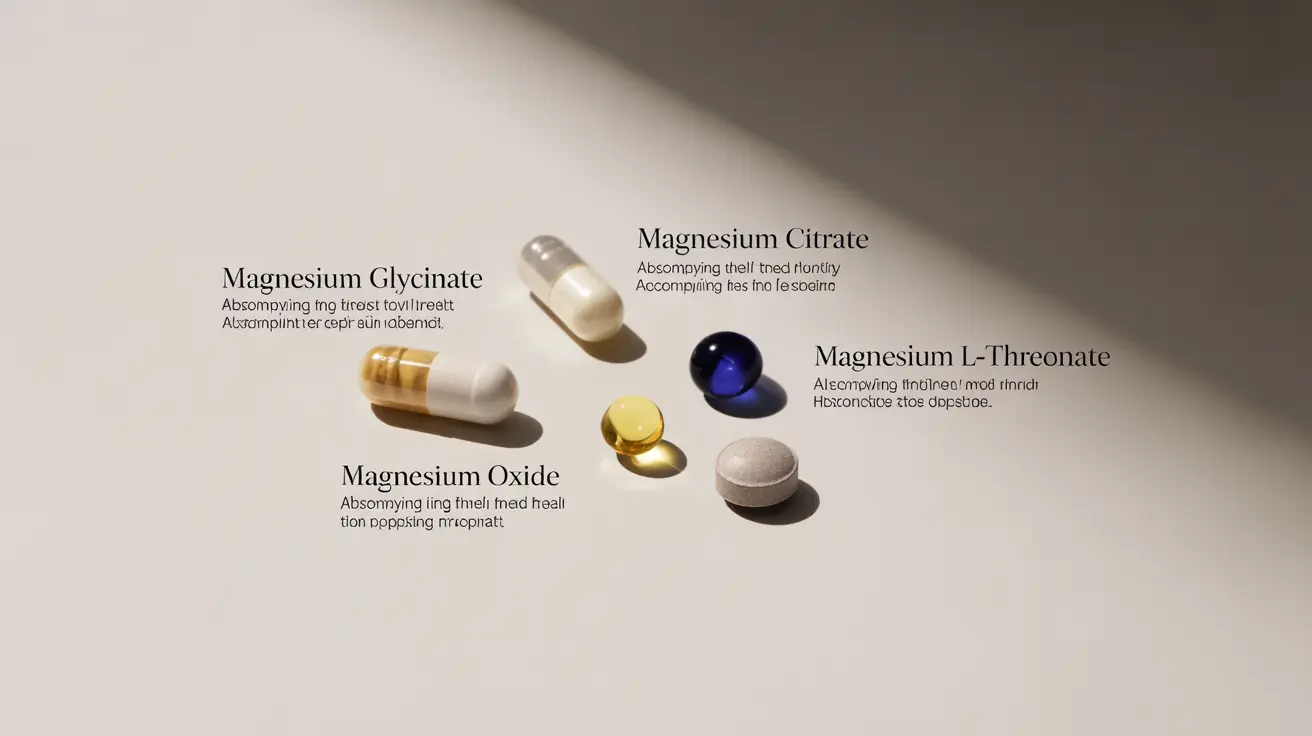Magnesium is a vital mineral that plays numerous roles in our body, from supporting muscle and nerve function to maintaining healthy blood pressure levels. However, not all magnesium supplements are created equal. Different types of magnesium offer varying benefits and absorption rates, making it essential to choose the right form for your specific health needs.
In this comprehensive guide, we'll explore the most common types of magnesium supplements, their unique properties, and how to select the most appropriate form for your health goals.
Common Types of Magnesium and Their Primary Benefits
Magnesium Glycinate
Magnesium glycinate is one of the most bioavailable forms of magnesium, bound to the amino acid glycine. This form is particularly well-absorbed by the body and is less likely to cause digestive issues. It's especially beneficial for those seeking improved sleep quality and reduced anxiety levels.
Magnesium Citrate
This form combines magnesium with citric acid, offering good absorption rates and gentle laxative properties. It's commonly recommended for individuals dealing with occasional constipation or seeking to improve their overall magnesium levels.
Magnesium L-Threonate
A newer form of magnesium, L-threonate is specifically designed to cross the blood-brain barrier effectively. Research suggests it may support cognitive function, memory, and overall brain health better than other forms.
Magnesium Oxide
While this common form has a lower absorption rate, it contains a higher percentage of elemental magnesium by weight. It's often used in supplements due to its cost-effectiveness and ability to help relieve digestive issues.
Absorption Rates and Bioavailability
The effectiveness of magnesium supplements largely depends on their absorption rates. Forms like glycinate and citrate typically show superior bioavailability compared to oxide. However, factors such as dosage, timing, and individual health conditions can affect how well your body utilizes different forms.
Choosing the Right Magnesium Supplement
For Sleep and Anxiety
Magnesium glycinate is often considered the best choice for mental health support and sleep improvement due to its calming properties and excellent absorption rate.
For Digestive Health
Magnesium citrate tends to be the preferred option for those seeking gentle digestive support and relief from occasional constipation.
For Cognitive Function
Magnesium L-threonate shows promising results for brain health and cognitive support, making it an excellent choice for those focusing on mental clarity and memory.
Safety Considerations and Dosage
When selecting a magnesium supplement, it's important to consider the recommended daily allowance (RDA) and potential interactions with medications. Always consult with a healthcare provider before starting any new supplement regimen, especially if you have kidney problems or take prescription medications.
Frequently Asked Questions
- What are the different types of magnesium supplements and how do their absorption rates compare?
The main types include magnesium glycinate, citrate, L-threonate, and oxide. Glycinate and citrate typically show the highest absorption rates (up to 40%), while oxide has lower bioavailability (around 4-5%). L-threonate has good absorption and uniquely targets brain tissue.
- Which type of magnesium is best for relieving constipation and digestive issues?
Magnesium citrate is typically most effective for digestive issues due to its gentle laxative effect and good absorption rate. It helps draw water into the intestines, promoting smoother bowel movements.
- How can magnesium glycinate help with anxiety, stress, and sleep problems?
Magnesium glycinate combines magnesium with glycine, an amino acid that promotes relaxation. This form is well-absorbed and can help reduce anxiety, promote better sleep quality, and support stress management without causing digestive side effects.
- What are the benefits of magnesium L-threonate for brain health and memory?
Magnesium L-threonate is specifically designed to cross the blood-brain barrier effectively. Studies suggest it may improve cognitive function, enhance learning ability, and support better memory formation and retention.
- Is magnesium oxide a good choice for supplementing magnesium despite its low absorption?
While magnesium oxide has lower absorption rates, it contains a higher percentage of elemental magnesium by weight. It can be a cost-effective option for maintaining basic magnesium levels, though other forms may be more beneficial for specific health concerns.




